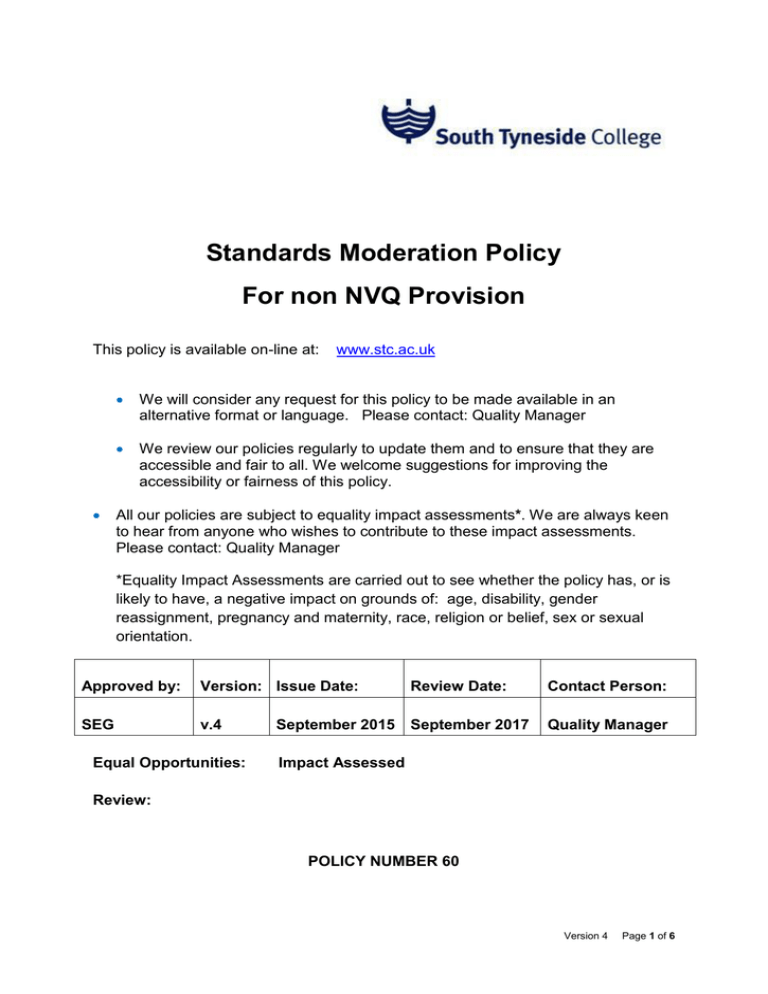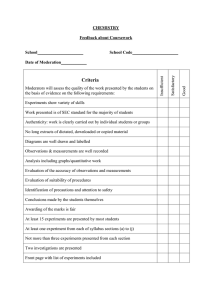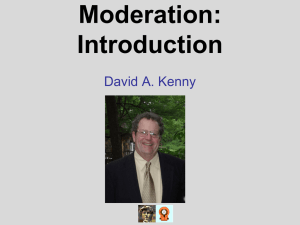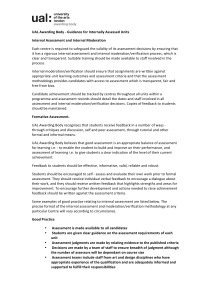Standards Moderation Policy v4 Sept 201
advertisement

Standards Moderation Policy For non NVQ Provision This policy is available on-line at: www.stc.ac.uk We will consider any request for this policy to be made available in an alternative format or language. Please contact: Quality Manager We review our policies regularly to update them and to ensure that they are accessible and fair to all. We welcome suggestions for improving the accessibility or fairness of this policy. All our policies are subject to equality impact assessments*. We are always keen to hear from anyone who wishes to contribute to these impact assessments. Please contact: Quality Manager *Equality Impact Assessments are carried out to see whether the policy has, or is likely to have, a negative impact on grounds of: age, disability, gender reassignment, pregnancy and maternity, race, religion or belief, sex or sexual orientation. Approved by: Version: Issue Date: Review Date: Contact Person: SEG v.4 September 2017 Quality Manager Equal Opportunities: September 2015 Impact Assessed Review: POLICY NUMBER 60 Version 4 Page 1 of 6 1. Rationale This policy has been revised to build on the effective Standards Moderation system operated at South Tyneside College and to establish further consistency and standardisation in the practice of internally moderating non-NVQ programmes. This policy embraces the College’s commitment to policies and practices based on the principles of fairness, openness and transparency for its learners, customers and employees. The policy will continue to ensure that feedback received from awarding/validating bodies about the quality of our provision is positive and will continue to ensure that assessment decisions made at the College are accurate, consistent and meet the national standards. This revised policy has been amended in light of best practice of awarding/validating bodies and should be read in conjunction with the College Standards Moderation Procedures for non-NVQ provision. 2. Aim The aim of this policy is to implement a transparent, fair and consistent Standards Moderation system based on the requirements and best practice of awarding/validating bodies, thereby ensuring that assessment is accurate, fair and consistent and that assessors are consistent in their interpretation and application of the national standards for the award. 3. Principles on which the policy is based Standards Moderation, and specifically within this system - Internal Moderation, must ensure the accuracy and consistency of assessment decisions between assessors operating at the College and that assessors are consistent in their interpretation and application of the national standards for the award. This Standards Moderation Policy (in conjunction with the revised College Standards Moderation Procedures for non-NVQ provision) will ensure that these principles are upheld by ensuring that all learners, assessors and internal moderators know and understand their rights, responsibilities and accountabilities with regards to the process of standards moderation at the College. An effective Internal Moderation system, established via consistent implementation of this policy and associated procedures, has the following benefits: a. The College continues to develop the reputation and practice that attracts a diversity of learners who want to study in the organisation and the very best job applicants/employees from all backgrounds; b. Enhanced levels of public confidence in the standard of learners progressing from the College; c. Consistently high levels of recruitment, retention and achievement of learners; d. High levels of learner and staff satisfaction in learning and working practices; e. Minimum levels of grievances, complaints and academic appeals. Version 4 Page 2 of 6 4. Student Entitlements Effective implementation of this policy will help to ensure that all learners studying non-NVQ programmes at the College are entitled to: a. a comprehensive induction programme, outlining the information, support and guidance available to them, the approaches to teaching, learning and assessment that will be employed, and the expectations of the programme; b. an individual learning plan and/or assessment plan based upon the outcomes of initial assessment, progress on the qualification and/or expertise/experience in the sector of study which identifies specific and challenging targets agreed with their tutor/assessor; c. continuous guidance and support from tutors/assessors addressing progress in learning and achievement and lack of progress due to any difficulties being experienced; d. have their work assessed and internally moderated in terms of its validity, authenticity and sufficiency in a fair, consistent and transparent system. 5. Student Responsibilities Successful assessment and internal moderation is a two-way process which also places responsibilities on the learner. Learner entitlements are most likely to be met fully when all learners: a. Meet their responsibilities, as outlined in the College student charter. b. Meet targets established with their tutor/assessor in their learning/assessment plan. c. Submit work for assessment in accordance with their learning/assessment plan. d. Present evidence for assessment and internal moderation when requested. 6. Teaching Staff Responsibilities With reference to Standards Moderation, teaching staff involved in delivering, assessing and internally moderating these qualifications are termed, Assessors, Internal Moderators and Internal Moderator Coordinators. An overview of the role and responsibilities of these key staff are outlined below. For specific and comprehensive detail of the responsibilities and accountabilities of these staff, please refer to section 2 of the Standards Moderation Procedures for non-NVQ provision. Version 4 Page 3 of 6 a. Assessors: In addition to being occupationally competent, qualified to an appropriate standard for the qualification on which they are assessing and having relevant occupational/subject expertise, Assessors are responsible for: 1) Managing the assessment system, from assessment planning, to assessment feedback, and assessment decisions, as required by the awarding/validating body. 2) Fairly, accurately and consistently assessing evidence of candidate performance against the national standards in the qualification, as described in the awarding/validating body programme specification (or equivalent document), and to L3 standards in assessing the quality of assessment as appropriate. 3) Ensuring the candidates’ evidence is valid, authentic and sufficient. 4) Maintaining accurate and verifiable records of candidate assessment decisions and achievement, as required by the awarding/validating body. 5) Maintaining their own CPD in accordance with the requirements of the awarding/validating body. b. Internal Moderators: In addition to being occupationally competent, qualified to an appropriate standard for the qualification on which they are moderating and having relevant occupational/subject expertise and appropriate experience, Internal Moderators are responsible for: 1) Managing the standards moderation system, from assessment planning, to assessment feedback, and assessment decisions (and certification (including unit certification) where appropriate) as required by the awarding/validating body. 2) Establishing procedures to ensure that all assessors interpret the national standards in the same way. 3) Regularly sampling evidence of assessment activities made by assessors, in accordance with their IM sampling plan, to ensure the fair, accurate and consistent interpretation and application of the national standards in the qualification, as described in the awarding/validating body programme specification (or equivalent document), and to L4 standards in assuring the quality of assessment as appropriate. 4) Monitoring and supporting the work of assessors, including the facilitation of appropriate staff development and training for assessors. Version 4 Page 4 of 6 5) Maintaining up to date records of IM and sampling activity and ensuring that these are available for external verification/moderation/examination. 6) Maintaining their own CPD in accordance with the requirements of the awarding/validating body. c. Internal Moderator Coordinators: In addition to being occupationally competent, qualified to an appropriate standard for the qualification on which they are moderating and having relevant occupational/subject expertise and appropriate experience, Internal Moderator Coordinators are responsible for: 1) Liaising with the awarding/validating body regarding arrangements/requirements for external moderation/verification/examination. 2) Providing feedback to the external moderator/verifier/examiner on the effectiveness of assessment. 3) Ensuring that any corrective action required by the awarding/validating body is carried out within agreed timescales. NB – In teams where the role of internal moderator and internal moderator coordinator are being performed by the same person, the responsibilities and accountabilities of the internal moderator coordinator are in addition to those of the role of the internal moderator. Where the role of IM and IM Coordinator are performed by separate individuals, the role of IM Coordinator is usually performed by the Curriculum Leader. 7. Management Responsibilities College Management should ensure that: a) All teaching staff on non-NVQ provision (i.e. assessors, internal moderators and internal moderator coordinators), including Agency Staff, are fully conversant with this policy (including associated procedures) and the demands it places on them; b) All teaching staff on non-NVQ provision, including Agency Staff, actively promote the principles of equality and diversity and health and safety in their teaching, assessment and internal moderation; c) All teaching staff on non-NVQ provision, including Agency Staff, receive appropriate training and development to enable them to meet their responsibilities and gain a common understanding of relevant standards and associated requirements; Version 4 Page 5 of 6 d) All newly appointed teaching staff on non-NVQ provision, including Agency staff, have induction training in the delivery, assessment and internal moderation of their programme(s), as required to enable them to meet their responsibilities. 8. Standards by which the success of the policy can be evaluated a) Positive internal moderation reports confirming that there is accuracy and consistency of assessment decisions between assessors and that assessors are consistent in their interpretation and application of the national standards for the award; b) Positive external moderator/verifier/examiner reports confirming that national standards are being consistently maintained, internal moderation practice meets the standards of the awarding/validating body, awarding/validating body guidance/regulations are being upheld and that the College continues to meet the awarding/validating body requirements for centre approval; c) Positive audit reports confirming that the College Standards Moderation Policy, the College Standards Moderation Procedures for non-NVQs provision, and associated documentation, are being consistently applied. 9. Responsibility for implementing the policy Responsibility resides at all levels across the College: a) The Principal has overall responsibility for the implementation of this policy; b) The Principal and Assistant Principals are responsible for overseeing the implementation of Sections 4 and 6; c) Assistant Principals and Curriculum Managers are responsible for ensuring that course teams (i.e. assessors, internal verifiers and internal verifier coordinators) collaboratively address the requirements of this policy; d) The teaching staff are responsible for meeting Student Entitlements as described in Section 4; 10. Review The effectiveness of this policy will be monitored annually and reviewed every two years in light of experience and best practice. This mechanism recognises that changes by the Awarding/Validating Body may prompt a review of the policy before the two years stipulated. In considering the effectiveness of this policy consultation will be undertaken with staff and managers to assist in the review process. The next review is due in September 2017. Version 4 Page 6 of 6


